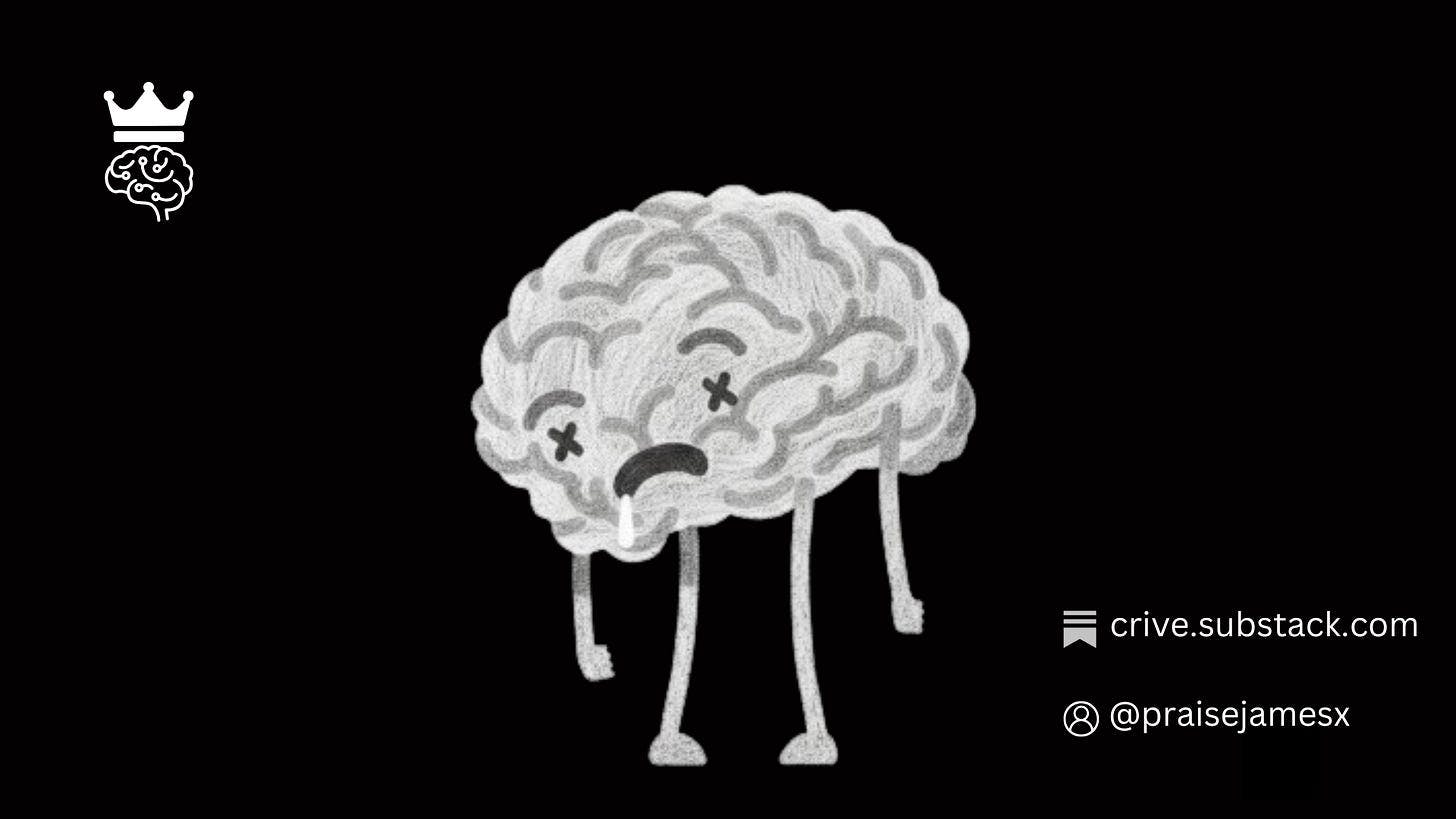You stay up till 3am "working hard" and wake up tomorrow with the same strategy, same information, same results.
You grind 100 hours a week because you heard Elon does it. You sacrifice sleep, skip meals, strain your brain to the breaking point, then wonder why nothing works.
You're cutting grass with scissors.
And the world doesn't give a shit how much you suffer while doing it.
The Real Enemy: Misaligned Incentives
The problem isn't that people are stupid. The problem is that our systems reward the wrong behaviors.
In most organizations, appearing busy matters more than producing results. Working late signals commitment when output is hard to measure. Suffering becomes currency in environments where actual value creation is invisible.
You brag about 16-hour days not because you're masochistic, but because it's the only metric others can see. Meanwhile, the person who solves the same problem in 2 hours with better thinking gets ignored.
This creates a death spiral: effort becomes the proxy for competence.
The Suffering-Razor Test
Here's how to spot someone who's full of bullshit: they brag about their suffering.
"I've been working 16-hour days for months." "I haven't taken a day off in two years." "I've sacrificed everything for this business."
If you measure your worth by how much you’ve suffered, you’re already losing. The graveyards are full of people who worked themselves to death with nothing to show. Suffering without results is invisible — and that’s the point.
The world is full of people who suffered and died. The media doesn't tell their stories because suffering without results is boring. It doesn't get clicks. It doesn't sell courses.
Suffering is a common factor for everyone on earth. Those who obsess over measuring it are playing a status game. They want to position themselves well—if they're not winning, they want you to know what they've been through to justify it.
This is the skinny brain epidemic: starving your mind while overworking your body.
What Skinny Brain Actually Looks Like
You know someone with skinny brain when they:
- Work constantly but never compound their learning
- Repeat the same low-leverage activities expecting different results
- Consume information but never synthesize new knowledge
- Mistake being busy for being effective
They're trapped in linear thinking. More hours = more results. More courses = more knowledge. More tools = more capability.
But Elon doesn't work harder than a drycleaner. He works on exponentially more valuable problems. The difference isn't effort—it's leverage.
Don't be like the market woman who goes to market with $30 worth of tomatoes and prays for millions.
Her profit is capped by her input. No amount of prayer or hard work changes the mathematical ceiling.
If your maximum output is determined by your physical input, you're playing the wrong game. You're optimizing within constraints instead of changing the constraints.
The Knowledge Creation Solution
The real insight isn't "work smarter, not harder." It's "create new knowledge instead of following old patterns."
Anything difficult signals a gap in explanatory knowledge. The solution isn't grinding through the difficulty—it's creating better explanations that eliminate the difficulty.
When you hit a wall, ask: "What would I need to understand to make this obvious?" Then build that understanding.
The amount of wealth created during the AI boom dwarfs the internet boom. Each knowledge breakthrough enables exponentially more breakthroughs. Your job is to participate in this knowledge creation, not just consume it.
Stop optimizing effort. Start optimizing leverage.
Writing is leverage. One essay reaches millions without repeating yourself.
Code is leverage. Software works while you sleep.
Systems are leverage. Good processes compound your thinking.
Teaching is leverage. Solve once, sell repeatedly.
The goal: solve a problem in your life, then scale the solution. Document your process. Turn your learning into systematic knowledge others can apply.
Writing isn't just communication—it's knowledge creation. Every essay clarifies your thinking and builds your intellectual capital.
Feed your brain signal, not noise: Curate ruthlessly. Read primary sources and fundamental principles. Avoid information junk food.
Create thinking space: Your best insights come during rest, not grinding. Schedule downtime like you schedule work.
Iterate your methods: Don't just work on problems—work on your problem-solving process. Meta-improvement compounds.
Document everything: Turn your learning into leverageable assets. Every solved problem becomes intellectual property.
Seek unique problems: Don't compete where everyone else competes. Find problems only you can see and solve.
The Meta-Game
The people winning aren't working the hardest. They're working on problems with the highest convexity (maximum upside, minimum downside).
They understand that in a world of infinite information, attention is the scarce resource. They've learned to say no to almost everything so they can say yes to the few things that compound.
They don't cut grass with scissors while bragging about their blisters. They build lawnmowers and teach others to do the same.
Your Next Move
Stop measuring your worth by your suffering. Start measuring it by your leverage.
The question isn't "How hard are you working?" It's "What unique problems are you solving that only you can solve?"
Identify where you're using scissors. Find the machine that makes the work obsolete. Build that machine. Teach others to build it too.
Your brain isn't meant to be skinny. It's meant to be a knowledge-creation engine.
Want the mental operating system that transforms you from a commodity worker into an irreplaceable value creator?
I've built the 6-Day Unlearning Program that shows you exactly how to:
- Delete the toxic Industrial-Age software (Effort, Mass Education, Perfectionism) that's currently keeping you busy but broke.
- Install the upgraded Creator Economy thinking that gets you exponential results from linear effort using Permissionless Leverage.
- Develop the Specific Knowledge and Network Systems that allow you to anticipate market moves and build wealth while others are reacting
To get it for free, join my newsletter: https://crive.substack.com/ or click the subscribe button on Hackernoon.


